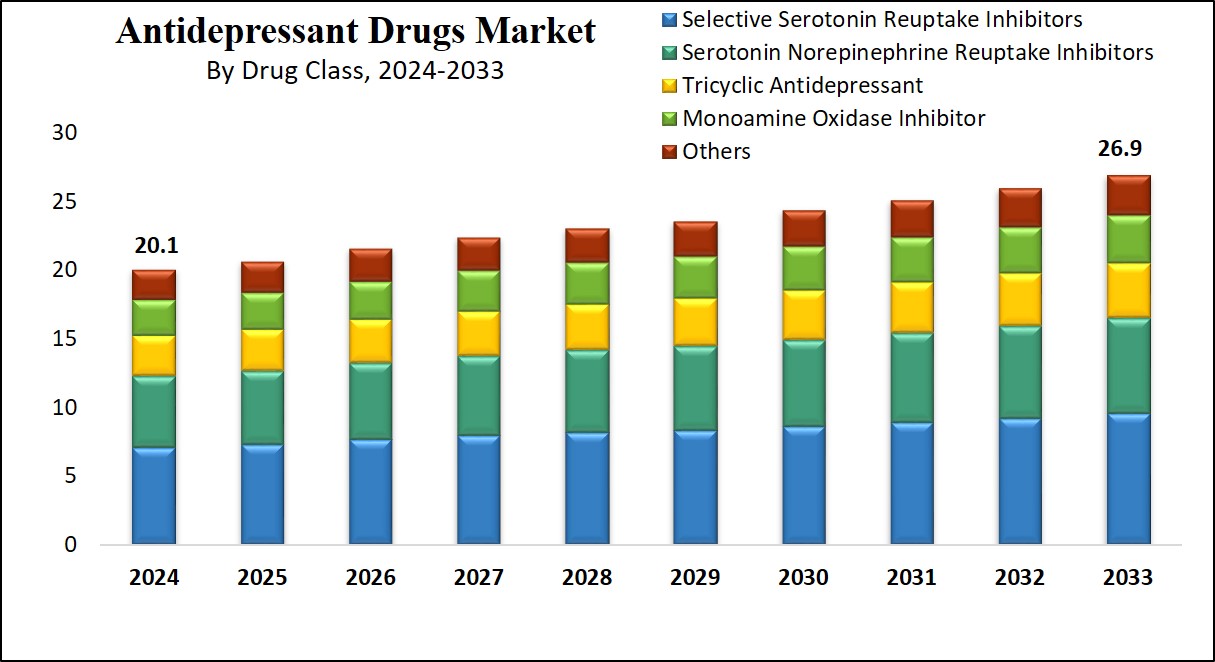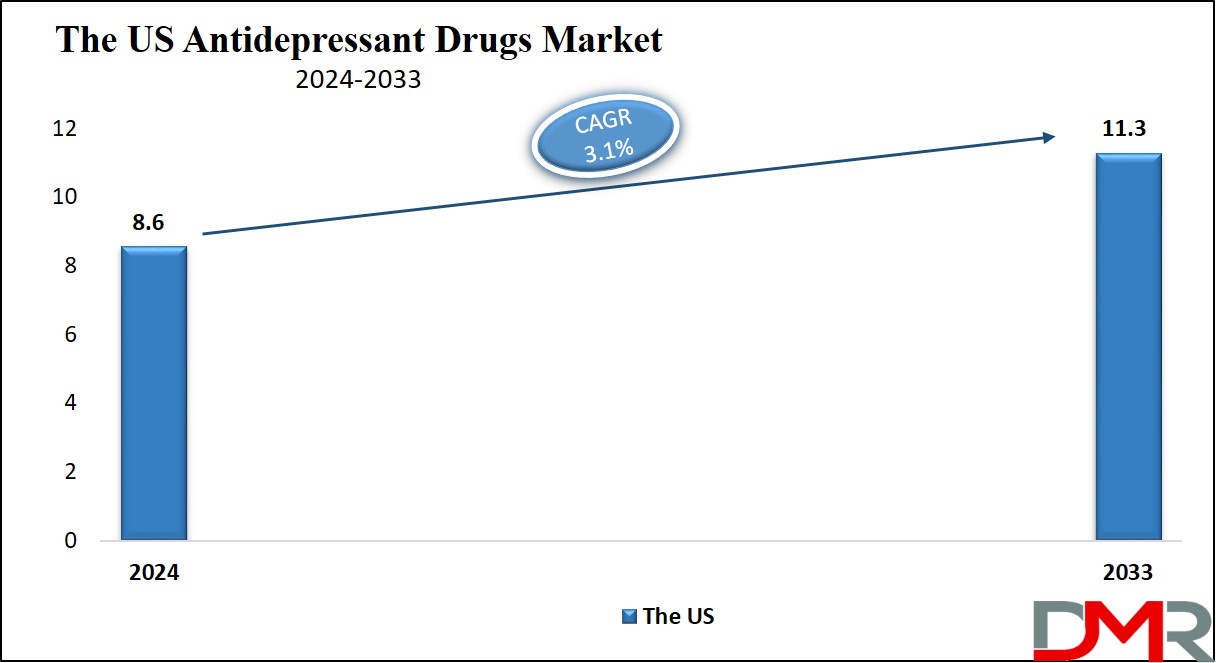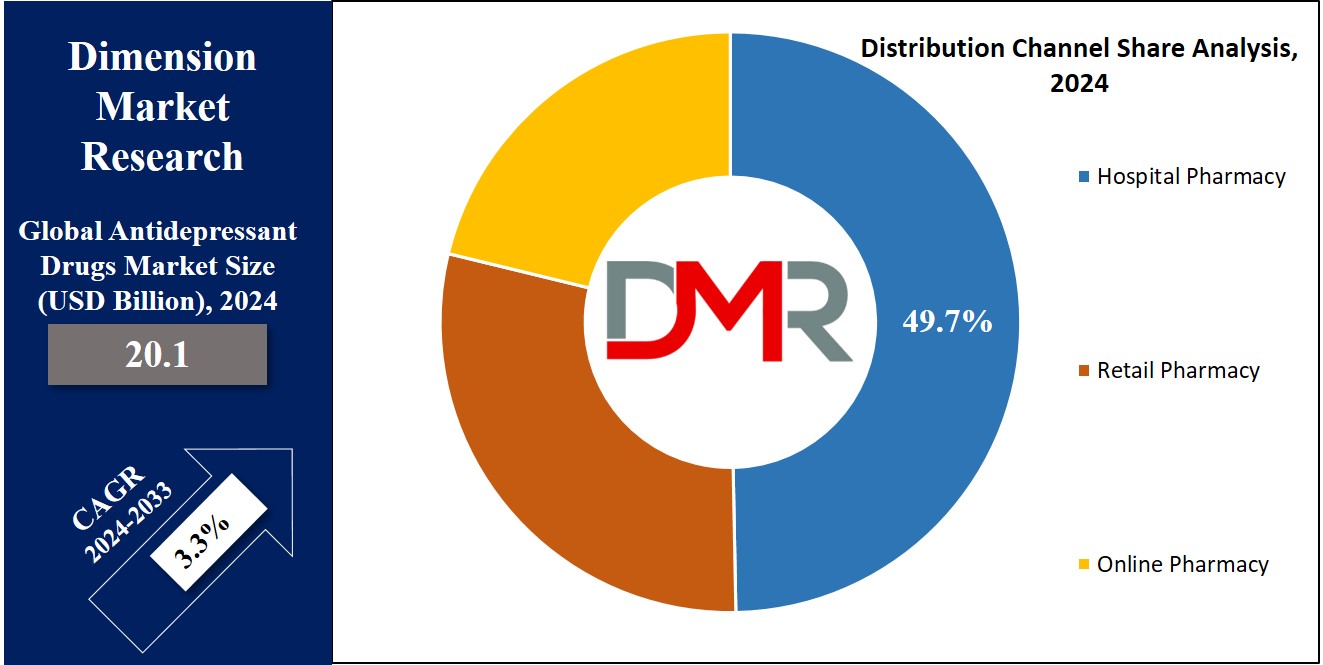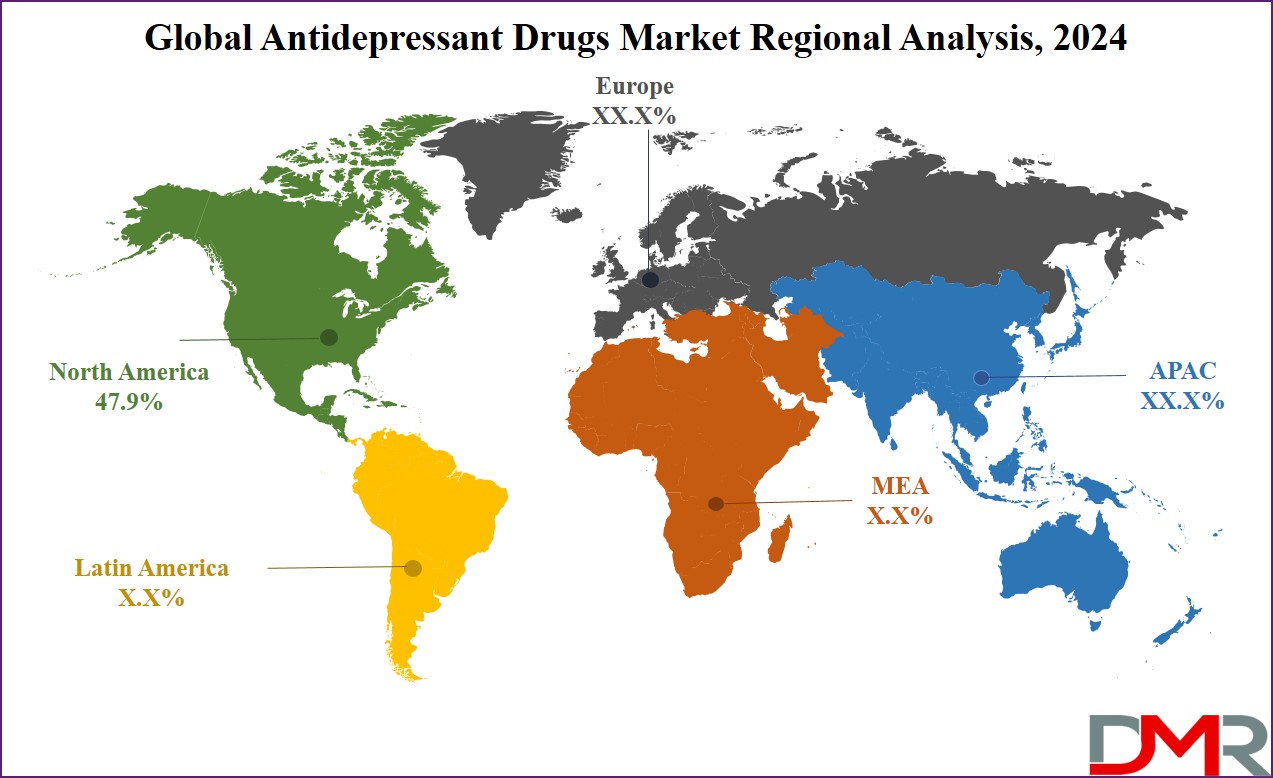
Depression might make certain individuals take their lives. A healthcare provider might recommend antidepressants for chronic pain or insomnia anxiety. Further, healthcare providers recommend more up-to-date antidepressants first since they don't cause as many side effects as older types. Depression symptoms can differ, and one antidepressant might be better at relieving some of them than another.
The antidepressant drugs market is witnessing significant activity, driven by increasing awareness of mental health issues. Events and conferences, such as the Global
Mental Health and Antidepressant Summit, spotlight advancements in drug formulations and therapeutic approaches. Surveys reveal rising demand for selective serotonin reuptake inhibitors (SSRIs) and novel drugs addressing treatment-resistant depression.
Recent mergers, like Pfizer's acquisition of a biopharma firm specializing in neurology, underscore growing investment in R&D. Opportunities lie in expanding access to innovative treatments in emerging markets and personalized medicine. Latest news highlights clinical trials of ketamine-based therapies, revolutionizing treatment paradigms and driving the market forward.
According to PMC, a comprehensive meta-analysis of nearly 26,000 patients across 117 antidepressant trials highlights significant variations in efficacy and tolerability among antidepressants. Response rates for acute treatments over eight weeks were observed to be 25% to 40% higher with mirtazapine, escitalopram, venlafaxine, and sertraline compared to duloxetine, fluoxetine, fluvoxamine, paroxetine, and reboxetine.
The US Antidepressant Drugs Market
The US Antidepressant Drugs Market is projected to reach USD 8.6 billion in 2024 at a compound annual growth rate of 3.1% over its forecast period.

In the antidepressant drugs market in the US, growth opportunities lie in the development of innovative treatments, like fast-acting medications and customized therapies. Growth in awareness of mental health, along with rising diagnosis rates, boosts demand. In addition, expanding
telehealth services and access to online pharmacies improves patient convenience, while the introduction of generic options makes treatments more affordable for a large population.
Further, the primary growth driver is the rise in the number of mental health disorders, leading to greater demand for effective treatments. However, a major restraint is the side effects linked with many antidepressants, which can deter patients from adhering to prescribed therapies. In addition, stigma surrounding mental health may further impact treatment-seeking behavior among individuals.
Key Takeaways
- Market Growth: The Antidepressant Drugs Market size is expected to grow by 6.2 billion, at a CAGR of 3.3% during the forecasted period of 2025 to 2033.
- By Drug Class: The selective serotonin reuptake inhibitors (SSRIs) segment is anticipated to get the majority share of the Antidepressant Drugs Market in 2024.
- By Depressive Disorders: The Major Depressive Disorder (MDD) segment is expected to be leading the market in 2024
- By Distribution Channel: The hospital pharmacy segment is expected to get the largest revenue share in 2024 in the Antidepressant Drugs Market.
- Regional Insight: North America is expected to hold a 47.9% share of revenue in the Global Antidepressant Drugs Market in 2024.
- Use Cases: Some of the use cases of Smart Parking systems include anxiety disorders, post-traumatic stress disorders, and more.
Use Cases:
- Major Depressive Disorder (MDD): Antidepressants are mostly prescribed to treat MDD, supporting to alleviate symptoms like persistent sadness, loss of interest, and fatigue, ultimately improving patients' quality of life.
- Anxiety Disorders: Many antidepressants, mainly SSRIs, are effective for various anxiety disorders, like generalized anxiety disorder and panic disorder, by stabilizing mood and reducing anxiety symptoms.
- Obsessive-Compulsive Disorder (OCD): Certain antidepressants can help manage OCD symptoms by lowering the frequency and intensity of obsessive thoughts and compulsive behaviors, enhancing daily functioning.
- Post-Traumatic Stress Disorder (PTSD): Antidepressants can be an important part of PTSD treatment, minimizing symptoms like flashbacks and emotional numbness, thus facilitating recovery and improving overall mental health.
Market Dynamic
Driving Factors
Increasing Prevalence of Mental Health Disorders
The growth in the incidence of depression, anxiety, and other mental health conditions across the world is driving the need for antidepressants. Factors like lifestyle changes, urbanization, and post-pandemic psychological challenges have increased awareness about mental health. Greater adoption of seeking medical help and less stigma allows more patients to explore
pharmaceutical solutions. Government programs promoting mental health treatment access further support this demand growth.
Advancements in Drug Development and Personalized Medicine
Constant innovation in antidepressant formulations, like new therapies like ketamine-based drugs and fast-acting agents, is expanding treatment options. Using biomarkers & genetic insights, customized medicine approaches allow more targeted and effective treatments, enhancing patient outcomes. In addition, extended patent protections for new drugs and collaborations between pharmaceutical companies and research institutions further boost the market.
Restraints
Side Effects and Risk of Dependency
Many antidepressants, like SSRIs and SNRIs, are linked with side effects like weight gain, sexual dysfunction, and fatigue, which may prevent adherence. In addition, concerns about dependency and withdrawal symptoms, especially with long-term use, create hesitancy among both patients and healthcare providers, which limits sustained drug adoption and opens space for alternative therapies like psychotherapy or herbal treatments.
Delayed Onset and Limited Efficacy in Some Cases
Antidepressants mostly take several weeks to show therapeutic effects, which can be frustrating for patients looking for quick relief. Furthermore, not all individuals respond positively to these medications, with some experiencing lesser improvements or treatment resistance, which, along with the trial-and-error nature of prescribing, reduces patient trust and impacts market expansion.
Opportunities
Growing Focus on Fast-Acting Treatments
Developments like ketamine-based therapies and psilocybin (psychedelic-assisted treatments) offer quick relief for treatment-resistant depression, addressing unmet needs in the market. These emerging treatments can reshape the landscape by attracting patients dissatisfied with traditional drugs. Regulatory approvals & clinical trials are developing, signaling significant future market growth.
Rising Adoption of Telemedicine and Digital Mental Health Platforms
The growth in the utilization of telemedicine supports simple access to prescriptions and mental health consultations, driving antidepressant demand.
Digital platforms providing remote counseling and medication management enhance adherence rates, which is especially relevant in rural or underserved areas where traditional healthcare access is limited, expanding the market's reach.
Trends
Shift Toward Novel Mechanisms of Action
There is a rising interest in developing antidepressants with new targets, like NMDA receptor antagonists and psychedelic compounds. These drugs provide quick relief in comparison to traditional SSRIs and SNRIs, mainly for treatment-resistant depression, which reflects a move toward more innovative and fast-acting therapies to address unmet clinical needs.
Integration of Artificial Intelligence (AI) in Drug Development and Treatment
AI and machine learning are used to accelerate antidepressant discovery and optimize customized treatment plans. AI-powered platforms can predict patient responses based on genetic and clinical data, reducing trial-and-error prescribing, which improves treatment efficacy and reduces time to achieve remission, improving patient outcomes.
Research Scope and Analysis
By Drug Class
The selective serotonin reuptake inhibitors (SSRIs) segment is anticipated to lead the antidepressant drugs market in 2024. SSRIs are a highly used class of medications mainly prescribed to manage mental health conditions like anxiety disorders, depression, and other psychiatric illnesses. They work by preventing the reabsorption of serotonin in the brain, which boosts serotonin levels and improves mood.
They are commonly recommended as the first-line treatment for depression due to their effectiveness and favorable safety profile. In comparison to other antidepressants, SSRIs have a lower impact on the cholinergic system, minimizing side effects like dry mouth, constipation, and blurred vision, which makes them more tolerable for patients.
Further, the serotonin-norepinephrine reuptake inhibitors (SNRIs) segment is emerging as the fastest-growing category in the market due to their ability to treat numerous depression symptoms by affecting both serotonin and norepinephrine levels, providing a more complete therapeutic benefit, which makes them a valuable option for patients who do not respond well to other treatments.
As patents on branded SNRIs expire, more affordable generic versions are becoming available, contributing to the segment’s rapid expansion, which could make SNRIs accessible to a larger population, further driving their growth in the market over the coming years.
By Depressive Disorders
The antidepressant drug market is segmented into several segments based on different depressive disorders, including Major Depressive Disorder (MDD), Obsessive-Compulsive Disorder (OCD), Generalized Anxiety Disorder (GAD), Panic Disorder, and others.
Among these, MDD is anticipated to lead the global market in 2024, generating a major share of revenue, resulting from a complex interaction of biological, psychological, and social factors, making it one of the most challenging mental health disorders to manage.
Further, various risk factors contribute to the development of MDD, like major life changes, chronic illnesses, substance abuse, family history of mental health issues, and side effects from certain medications. To treat MDD, doctors mostly recommend antidepressants, mainly selective serotonin reuptake inhibitors (SSRIs), which help regulate mood by balancing serotonin levels in the brain.
The growing number of MDDs worldwide is driving demand for effective treatments, providing momentum for the antidepressant drugs market. As more people look for treatment and mental health awareness enhances the market.
By Distribution Channel
The global antidepressant drug market based on distribution channels is divided into hospital pharmacies, retail pharmacies, and online pharmacies. In 2024, hospital pharmacies are expected to lead the market, as they often serve as primary points of care, mainly for severe cases requiring immediate medical supervision. Patients visiting hospitals for consultations or treatment are more likely to fill their prescriptions at hospital pharmacies for convenience and continuity of care.

Further, there is a major transformation toward retail pharmacies as more patients prefer these for their accessibility and ease. Retail pharmacies are expanding because they allow patients to refill prescriptions without demanding frequent hospital visits. Further, online pharmacies are set to experience major growth over the coming years, due to growth in internet access and digital adoption in developing countries.
Many patients find it convenient to order medicines online due to home delivery options, discounts, and the availability of a variety of products, which shows a promising future for online pharmacies, with strong potential for market expansion.
The Antidepressant Drugs Market Report is segmented on the basis of the following
By Drug Class
- Selective Serotonin Reuptake Inhibitors
- Serotonin Norepinephrine Reuptake Inhibitors
- Tricyclic Antidepressant
- Monoamine Oxidase Inhibitor
- Others
By Depressive Disorders
- Major Depressive Disorder
- Obsessive-Compulsive Disorder
- Generalized Anxiety Disorder
- Panic Disorder
- Others
By Distribution Channel
- Hospital Pharmacy
- Retail Pharmacy
- Online Pharmacy
Regional Analysis
North America is anticipated to hold the largest share of the antidepressant drugs market, accounting for
47.9% in 2024, with steady growth expected during the forecast period. Mental health issues like anxiety and depression are mainly prevalent in the region, driving the growth in demand for antidepressant medications. Greater awareness, better diagnosis, and early intervention are contributing to the growth in prescriptions.

North America’s well-developed healthcare infrastructure, better regulatory framework, advanced research facilities, and presence of leading pharmaceutical companies make it easier to develop, manufacture, and distribute these medications efficiently.
Further, the Asia-Pacific region is anticipated to experience the fastest growth in the antidepressant drugs market during the forecast period. Economic, social, and lifestyle changes in the region are contributing to a growth in mental health conditions, like depression, leading to an increase in the need for effective treatments.
In addition, the region’s aging population is more prone to mental health issues, which further drives the need for antidepressants. As awareness about mental health enhances and healthcare systems continue to advance, the market for antidepressant drugs in Asia-Pacific is expected to expand significantly, opening up new growth opportunities.
By Region
North America
Europe
- Germany
- The U.K.
- France
- Italy
- Russia
- Spain
- Benelux
- Nordic
- Rest of Europe
Asia-Pacific
- China
- Japan
- South Korea
- India
- ANZ
- ASEAN
- Rest of Asia-Pacific
Latin America
- Brazil
- Mexico
- Argentina
- Colombia
- Rest of Latin America
Middle East & Africa
- Saudi Arabia
- UAE
- South Africa
- Israel
- Egypt
- Rest of MEA
Competitive Landscape
The antidepressant drug market is characterized by many key players who are actively involved in developing and marketing a range of medications. These companies aim for research &innovation to create effective treatments for various mental health conditions, like depression and anxiety disorders. The market is marked by current developments in drug formulations and the introduction of new therapies, like fast-acting antidepressants and combination treatments.
In addition, partnerships & collaborations between pharmaceutical firms and research institutions are common and focused on improving drug development processes. As competition intensifies, companies are also focusing on patient access and affordability, leading to a better availability of generic medications on the market.
Some of the prominent players in the Global Antidepressant Drugs are:
- Sanofi
- Eli Lilly & Company
- AstraZeneca
- Pfizer Inc
- Merck & Co Inc
- Novartis AG
- Opko Health
- AbbVie Inc
- Alkermes Plc
- F Hoffmann-la Roche
- Other Key Players
Recent Developments
- In September 2024, Strides Pharma Science Limited unveiled its subsidiary, Strides Pharma Global Pte. Limited gained approval from the United States Food & Drug Administration (USFDA) for Fluoxetine Tablets in the 60 mg dosage, which aligns the its recent approvals for Fluoxetine 10 mg and 20 mg tablets, and Fluoxetine capsules, positioning Strides to provide a comprehensive range of strengths across both tablet and capsule forms.
- In July 2024, Autobahn Therapeutics raised USD 100 million to advance an experimental mood disorder medicine into mid-stage testing, which is developing the drug for major depressive disorder and bipolar disorder depression. Called ABX-002, the drug works in a somewhat similar fashion to Madrigal Pharmaceuticals’ Rezdiffra, by replicating thyroid hormone receptors.
- In June 2024, Intra-Cellular Therapies, Inc. reported an evaluation of lumateperone 42 mg as an adjunctive therapy to antidepressants for the treatment of MDD, which is in conjunction with our earlier reported positive Phase 3 study, Study 501, forms the basis for its lumateperone sNDA for the adjunctive treatment of MDD.
- In April 2024, Otsuka Pharmaceutical, Co. Ltd. along with Click Therapeutics, Inc announced that the Food and Drug Administration (FDA) of the US cleared Rejoyn, the first prescription digital therapeutic authorized for the treatment of the major depressive disorder (MDD) symptoms, as an addition to clinician-managed outpatient care for adult patients with MDD.